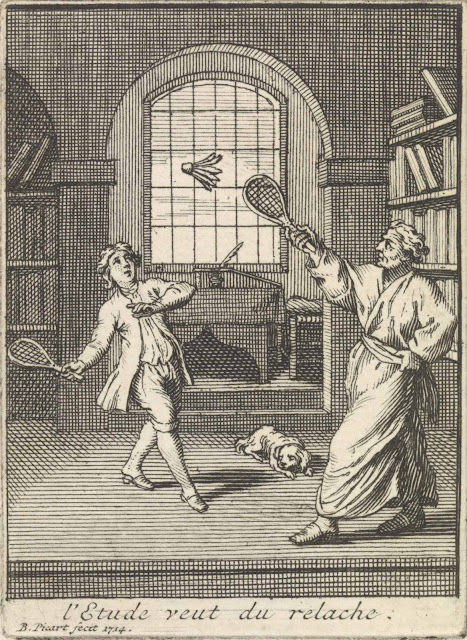 |
| Rembrandt Portrait of Johannes Wtenbogaert 1633 oil on canvas Rijksmuseum, Amsterdam |
 |
| Gerrit Dou Man smoking a pipe ca. 1650 oil on panel Rijksmuseum, Amsterdam |
"This is a mightie point, and requireth the care of a quicke and cleare braine: it is not enough that a man intending to build, should bring lime, stones, and other materials together, unlesse he take further care that all the congested stuffe might be well and orderly digested by a skilfull hand: even so in picture, the plentifull copiousnesse of a most rich and fertile argument shall be nothing else but an unpleasant heap of wildly scattered figures, unlesse Disposition tie them together by a good and decent order. Let all the joynts and members of a brasen figure be readie caste, yet shall they never make up a statue, not being fitted to their peculiar places; and if then any one part chance to be misplaced, if an eare standeth in place of the nose, if a leg be put where the arme should be, the whole figure will presently seem monstrous and prodigious: all the parts of our bodie, being but lightly put out of joynt, doe instantly lose they use they had before: so do disordered Armies most commonly feele the want of order. Nature it selfe seemeth to be upholden by order: and as it is certain that nothing, which wanteth this support, can subsist; so must Picture needs run at random, roving and wandering without any guide, after the fashion of those who straying in unknowne and dark places cannot tell where to beginne and where to end their journey, suffering themselves rather to be guided by chance than counsell: whosoever on the contrary hath but once framed in his minde a disposition of the conceived matter, the same, if he be but a tolerable Artificer, shall dispatch the rest with a wonderfull ease: "The matter being considered of aforehand," sayth Horace, "words use to follow with an unconstrained facilitie." The ancient Commentator instancing upon these words of the Poet, "Menander," sayth he, "having made the disposition of a fable, though he had not yet trimmed it up with verses, was wont to say that he had alreadie accomplished it."
– from Book Three (chapter five) of The Painting of the Ancients by Franciscus Junius, first published in English in 1638 – edited by Keith Aldrich, Philipp Fehl & Raina Fel for University of California Press, 1991
 |
| Anthonius Leemans Still Life 1655 oil on canvas Rijksmuseum, Amsterdam |
 |
| N L Peschier Vanitas Still Life 1660 oil on canvas Rijksmuseum, Amsterdam |
 |
| Jan Luyken Imperial Library and Cabinet of Curiosities 1682 etching Rijksmuseum, Amsterdam |
 |
| Bernard Picart Interior of a Library 1724 etching Rijksmuseum, Amsterdam |
 |
| Bernard Picart Playing Badminton in the Library 1714 etching Rijksmuseum, Amsterdam |
 |
| Cornelis Troost Portrait of Joan Jacob Mauricius 1741 pastel and gouache Rijksmuseum, Amsterdam |
 |
| Giovanni Battista Polanzani Portrait of Giovanni Battista Piranesi 1750 etching Rijksmuseum, Amsterdam |
 |
| François-André Vincent Portrait of a man ca. 1795 oil on canvas Rijksmuseum, Amsterdam |
 |
| Charles Howard Hodges Portrait of Cornelis Apostool, 1st Director of the Rijksmuseum ca. 1816 oil on canvas Rijksmuseum, Amsterdam |
 |
| Jan Adam Kruseman Portrait of Alida Christina Assink 1833 oil on canvas Rijksmuseum, Amsterdam |
 |
| Hendrik Jacobus Scholten Sunday Morning ca. 1865-68 oil on panel Rijksmuseum, Amsterdam |
 |
| Jacobus Ludovicus Cornet Scholar in his Study before 1882 etching Rijksmuseum, Amsterdam |
"There is a providence for impotent old men, to the end. And when they cannot swallow any more someone rams a tube down their gullet, or up their rectum, and fills them full of vitaminized pap, so as not to be accused of murder. I shall therefore die of old age pure and simple, glutted with days as in the days before the flood, on a full stomach. Perhaps they think I am dead. Or perhaps they are dead themselves. I say they, though perhaps I should not. In the beginning, but was it the beginning, I used to see an old woman, then for a time an old yellow arm, then for a time an old yellow hand. But these were probably no more than the agents of a consortium. And indeed the silence at times is such that the earth seems uninhabited. That is what comes of the taste for generalization."
– from Malone Dies by Samuel Beckett, originally published in French in 1951, translated by the author and first published in English in 1956